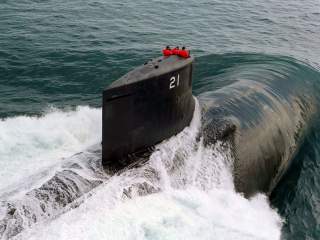The Russian Navy Is Developing a New Submarine That Can Perform One Truly Strange Trick
It will imitate the sound of an enemy submarine during naval exercises.
Russia’s Rubin design bureau is working on developing a miniature autonomous unmanned submarine that would be used to replicate the characteristics of a full-sized submarine. Called the Surrogat, the new underwater drone will do exactly what its name suggests—it will imitate the sound of an enemy submarine during naval exercises.
"Today, combat submarines have to be involved for exercises or tests and this practice distracts them from carrying out their basic missions. The use of an unmanned imitator will help avoid this and cut the cost of drills. Besides, a submarine without a crew reduces risks while keeping simulated scenarios realistic," Rubin chief executive officer Igor Vilnit told the Moscow-based TASS news agency. "This apparatus will be distinguished by its simplicity in operation and the low cost of its maintenance and upgrade. Now we’re holding consultations with Navy representatives to make the imitator fully meet the Navy’s requirements."
According to TASS, the Surrogat will be a modular design that will be able to replicate the acoustical characteristic of a nuclear or diesel-electric boat. The robotic sub will carry a host of towed arrays sonars and other features to help replicate a full-sized boat’s acoustic and electromagnetic signature—according to the Rubin design bureau. Surrogat also appears to have some capability for conducting surveillance missions independent of its role of being an aggressor platform.
The Surrogat will measure roughly 56ft long and is expected to displace about 40 tons. The vessel is being designed with a cruising range of about 600 miles at a speed of 5 knots. With its lithium-ion battery, it is expected to have an endurance of roughly 16 hours. The Russians claim that it will have a maximum speed of over 24 knots and the maximum diving depth of nearly 2000ft.
If the Russian Navy approves the Surrogat for full-scale development and the project is successful, it could be a very significant development in the battle for undersea dominance. The U.S. Navy is also working on unmanned underwater vehicles to augments its dwindling attack submarine fleet. A missionized version of Surrogat could serve in a similar role for Moscow—bolstering the capabilities of a much atrophied Russian submarine force that has only recently embarked on a revival of sort after its near collapse after the fall of the Soviet Union.
Dave Majumdar is the defense editor for The National Interest. You can follow him on Twitter: @davemajumdar.
Image: USS Seawolf conducts Bravo sea trials. Wikimedia Commons/Public domain.

